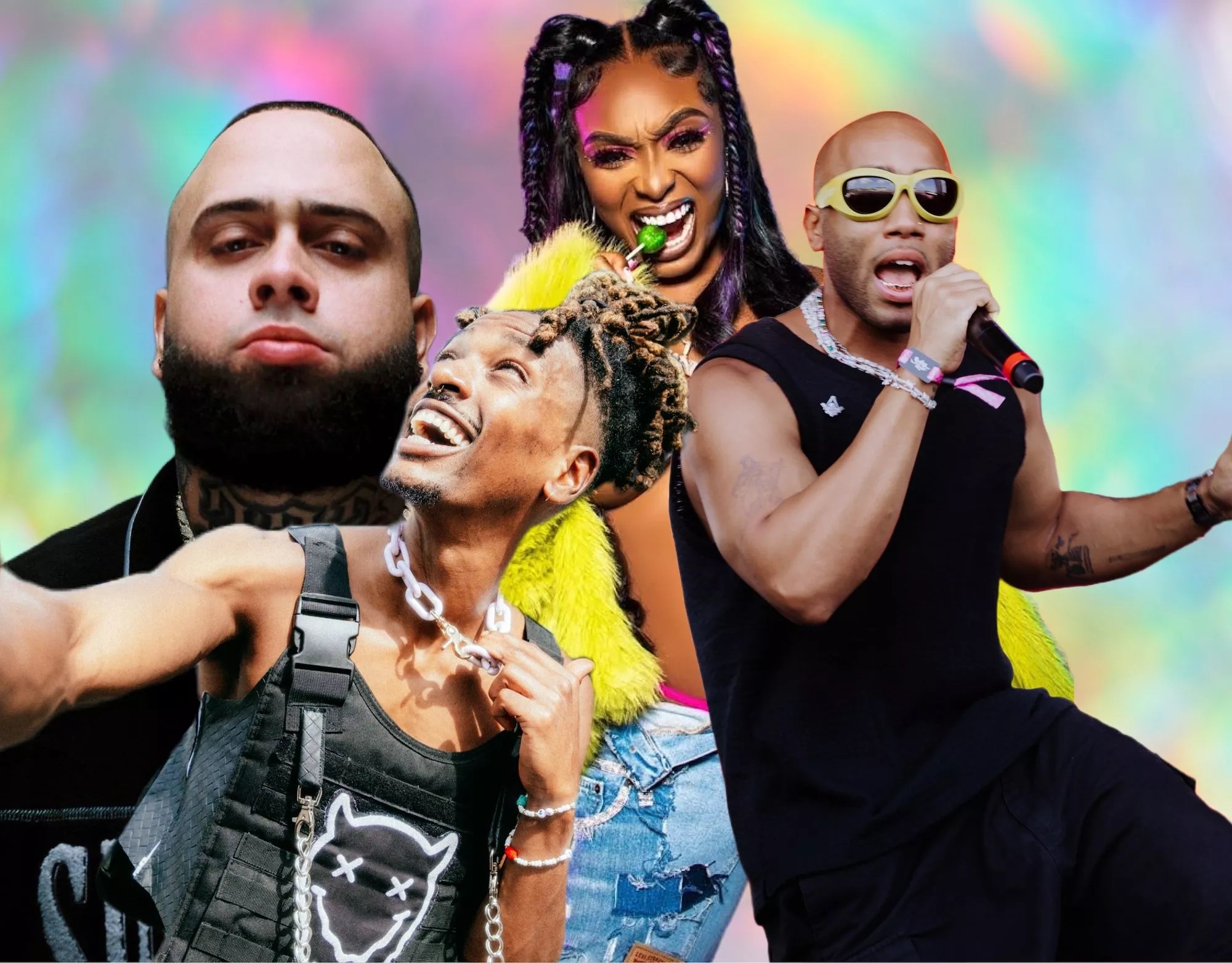
Photo illustration by Marjua Estevez/Photos by Columbia Records, Henry Hwu, Brian Lundquist, and Paperwork

Audio By Carbonatix
Hip-hop’s story of origin is repeated often: In the summer of 1973, DJ Kool Herc set up a pair of turntables and a mixer to spin records at a back-to-school block party on Sedgwick Avenue. This music – quite literally made from scratch – emerged from the rubble of the South Bronx and urban decay and washed over even the most remote parts of the world. Today, the spirit of corner store cyphers and basement block parties is everywhere, from the streets of London to the barrios of the Dominican Republic.
Yet, before hip-hop could take it this far, the pulse of rap music and its cultural politics were tethered to its cradle in New York. The genre’s authority was associated with the East and West Coasts for years – thanks to g-funk or gangsta rap. But Andre 3000 of OutKast would not come to accept a 1995 Source Award for “Best New Rap Group” and reiterate before the world that the South indeed had something to say were it not first for Uncle Luke’s then-foreign Miami bass and explicit lyrics.
One of the most controversial albums in history, Uncle Luke and 2 Live Crew’s As Nasty as They Wanna Be, went down in federal history as the first record to be deemed legally obscene. But in Dade County neighborhoods and cultural springs like Liberty City and Overtown, the 1989 album would be immortalized as an iconic tour de force of booty music and a glimpse of Southern Black Caribbean life that would ultimately help distinguish the southern region of the United States as a credible hip-hop scene.
This year’s edition of Rolling Loud at the Hard Rock Stadium in Miami Gardens was a shining reflection of the contemporary rap landscape, drawing emcees from coast to coast and of varied backgrounds. Among a sea of modern-day artists celebrating 50 years of hip-hop, from New York to Puerto Rico and everything in between, Florida rappers remain an ilk of their own.
“Versatility. That’s what has always set us apart. A type of versatility that’s going to catch and cause the proverbial wave,” Sudanese rapper-singer and 305 representative Hoosh tells New Times. “You can take it as far back as Uncle Luke and recognize the past of that versatility. In his style, his speech, his refusal to negotiate everything that he represented. Today’s SoundCloud movement spearheaded by the likes of XXX – rest in peace – and people like $ki Mask the Slump God, and now Danny Towers and Rob Banks, that’s all South Florida. We made alternative and experimental rap cool because we come from a long line of innovators.”
“My music is real in that I always want it to be fun, valuable, and engaging.”
For Pompano Beach native and rapper iCandy, following in the footsteps of women artists like Trina means showing up audaciously as her whole self. “I’m from Pompano, so it’s really about being organic, being honest with who I am and where we come from. My music is real in that I always want it to be fun, valuable, and engaging.”
She adds: “I want the world to know we were here. That we matter and our dreams matter. That we can make it out of this thing.”
Orlando-based rapper and songwriter Danny Towers embodies hip-hop’s perpetual migration. “It means the world for a Puerto Rican kid like me, coming from the island, that I can come to the U.S., not speaking a lick of English, and become not just a participant or contributor to this music, but a beneficiary of it. The genre and culture owes a lot to the Black community.”
Danny Towers’ new album with DJ Scheme, Safe House, prioritizes Florida artists, both established and rising, with features from $ki Mask the Slump God, Trapland Pat, Denzel Curry, Luh Tyler, and many more. “At the end of the day, I’m just happy to even be a part of this anniversary.”
Southern rap continues to lead the new school, shape popular culture, and shift worlds. “Hip-hop changed my life. Growing up in Miami the way I grew up, in a world where I wasn’t necessarily guided by my father, hip-hop showed me the way,” Bizzy Crooks explains to New Times. “Where I could have ventured off to what other people in my community were doing, hip-hop just proved to me, man, I could actually make something of myself. I was an awkward and quiet kid growing up, and hip-hop was my way of expressing myself.”
Of Black Caribbean descent, with roots in Cuba and the Dominican Republic, Bizzy Crook toasts hip-hop’s diasporic expansion and recognition. “When I was coming up, a lot of people told me, ‘Yo, just say you’re Black.’ They didn’t know how to market a Dominican artist in English or the Anglo market. Now seeing where we’ve taken this ‘Latin thing,’ I have a stage, and I think it’s beautiful. It’s all been a journey and a reminder just to be who you are. Original.”